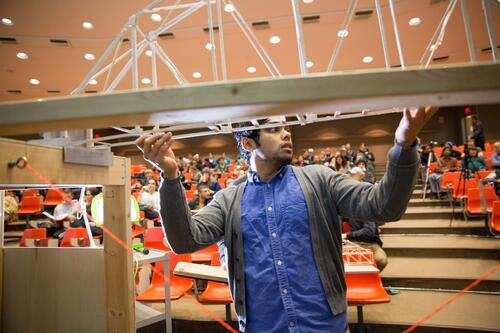
Physics student competes in the annual bridge-building contest.
SUNY Geneseo’s Department of Physics and Astronomy is one of three undergraduate programs in the United States to earn the American Physical Society’s (APS) Award for Improving Undergraduate Physics Education for 2019.
“This is a real tribute to the outstanding work of the faculty, staff, and students in our department,” said Department Chair and Distinguished Teaching Professor of Physics Charlie Freeman, who submitted the application last June. “I am very proud to be part of such a wonderful group of colleagues."
The APS’ Committee on Education “seeks to recognize excellence in undergraduate physics education and support best practices in education at the undergraduate level.” With this recognition, Geneseo becomes the first SUNY institution to receive the award since its inception in 2012.
In the award letter sent to Freeman, APS President Roger Falcone wrote: “The Committee on Education chose your program for this distinction due to your sustained, high-quality program that consistently produces high numbers of graduates. Geneseo’s commitment to physics education and to its students is particularly noteworthy and commendable.”
Freeman’s application made the case regarding how Geneseo’s program successfully met the award criteria, including how well a program improves student understanding of physics; increases the number of under-represented minorities and women in physics; supports physics majors choosing K-12 teaching careers; prepares students for careers; and improves undergraduate research opportunities.
Among the statistics and programs Freeman cited in support of Geneseo:
- Program size: Since its founding in 1963 by SUNY Distinguished Teaching Professor Robert “Duke” Sells, Geneseo’s physics department has grown into one of the largest of its kind in the nation. In academic years 2011–2017, Freeman and his colleagues have served 15,639 students taking physics classes — including nearly 200 majors currently pursuing B.A. degrees (physics, geophysics) or B.S. degrees (applied physics, biophysics.)
Over that same period, Geneseo has awarded 221 bachelor degrees in physics. According to the latest report (Oct. 2018) from the American Institute of Physics (AIP), which includes data from the class of 2016–2017, AIP ranked Geneseo No. 1 of 502 schools for producing the most physics bachelor's degrees at which the bachelor's degree in physics was the highest offered.
- Undergraduate research: The department enjoys a long-standing tradition of involving students in undergraduate research. This summer, 47 students worked on research projects, including eight who participated in the SURGE (Supporting Undergraduate Research at Geneseo) program led by Associate Professor George Marcus and Professor James McLean. SURGE is funded by the National Science Foundation (NSF). Geneseo’s is the only SUNY institution that is designated as an NSF Research Experiences for Undergraduates site for physics research. Twenty-one students also worked as part of a collaboration with the Laboratory for Laser Energetics (LLE) at the University of Rochester, for which Distinguished Teaching Professor of Physics Stephen Padalino serves as director.
- Women and under-represented student recruitment and retention: Assistant Professor Anne Pellerin recently established an active group, Geneseo Reaching Out to Women and under-represented groups in STEM, (GROW-STEM). This professional development group holds a variety of campus events that foster diversity and inclusion within the faculty and students in the STEM fields.
- Supporting engagement in K-12 teaching careers: As a member of the Physics Teacher Education Coalition, Geneseo was awarded a grant to support the Robert Noyce Teacher Scholarship Program, which rewards talented science and mathematics majors who want to share their knowledge, skills, and enthusiasm in high-needs school districts in grades 6–12 as certified through the Ella Cline Shear School of Education's adolescence certification program. Distinguished Teaching Professor of Physics and Astronomy Kurt Fletcher serves as project director.
“As one of the largest physics departments at a primarily undergraduate institution in the nation, our students receive a top-notch education in physics at Geneseo,” Freeman affirmed. “There are many opportunities for students to get hands-on experience working closely with faculty members on research projects. Our students are well-prepared for graduate studies in physics and related fields, and many are successful in a wide range of careers after graduation.”
In addition, the department cultivates a strong sense of family among students and faculty, highlighted by events such as physics picnics, summer barbeques, bridge-building contests, “Physics Bowl” competitions, and student vs. faculty Ultimate Frisbee games.
Professor Savi Iyer will represent Geneseo in accepting the award at the APS meeting in April in Denver. Rockhurst University in Kansas City, MO, and the University of Houston also received the Award for Improving Undergraduate Physics Education.
- By Tony Hoppa